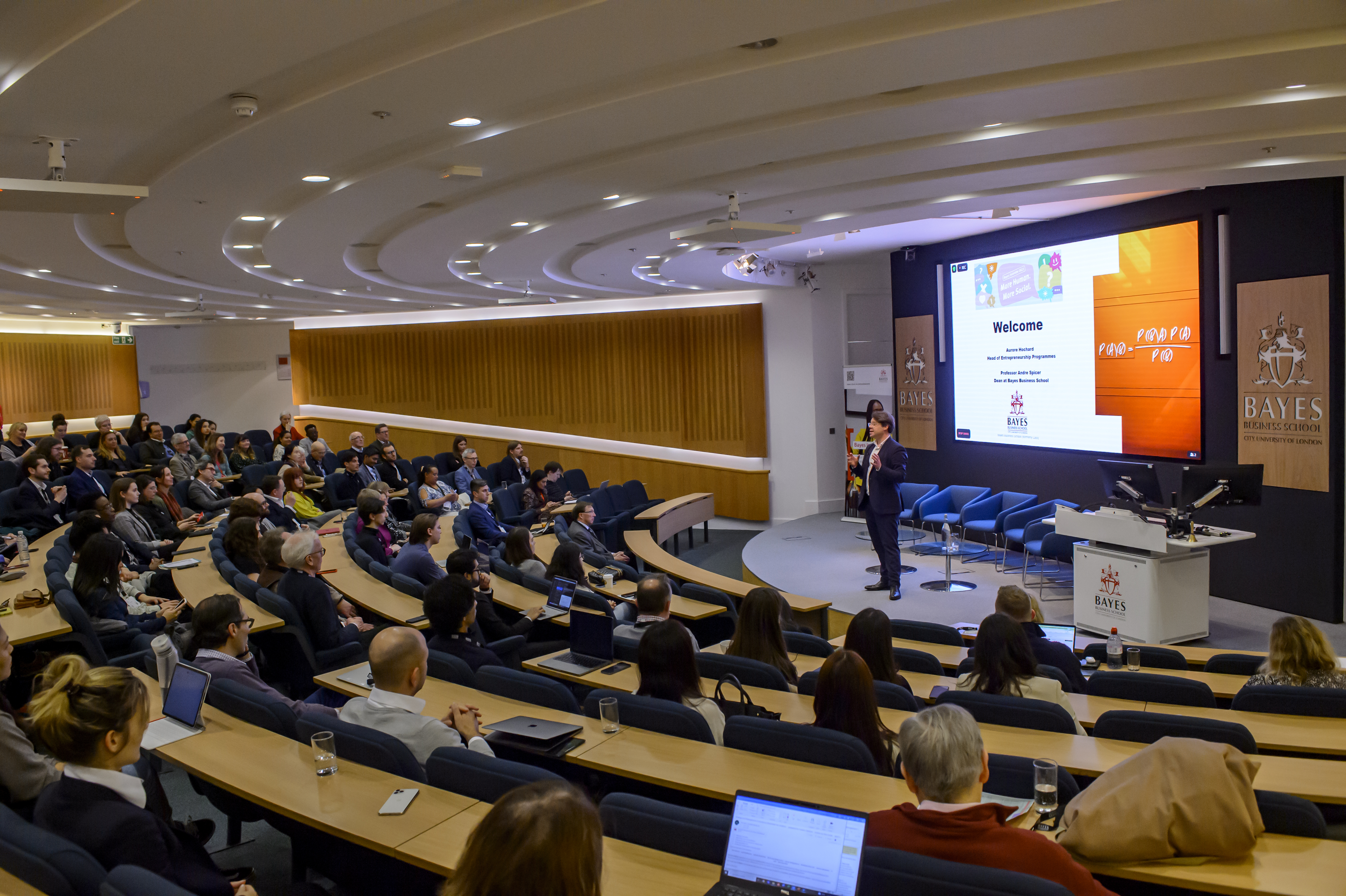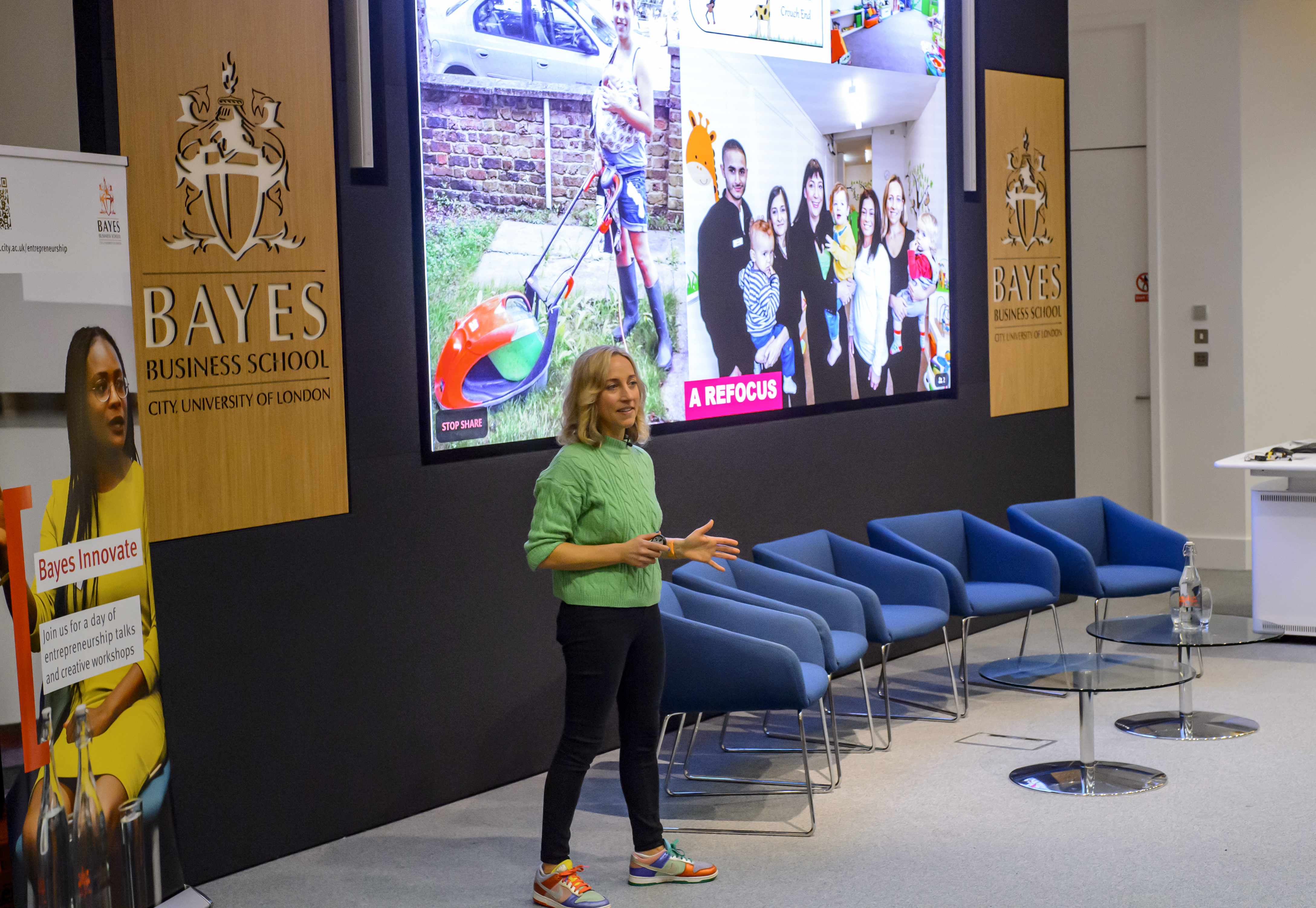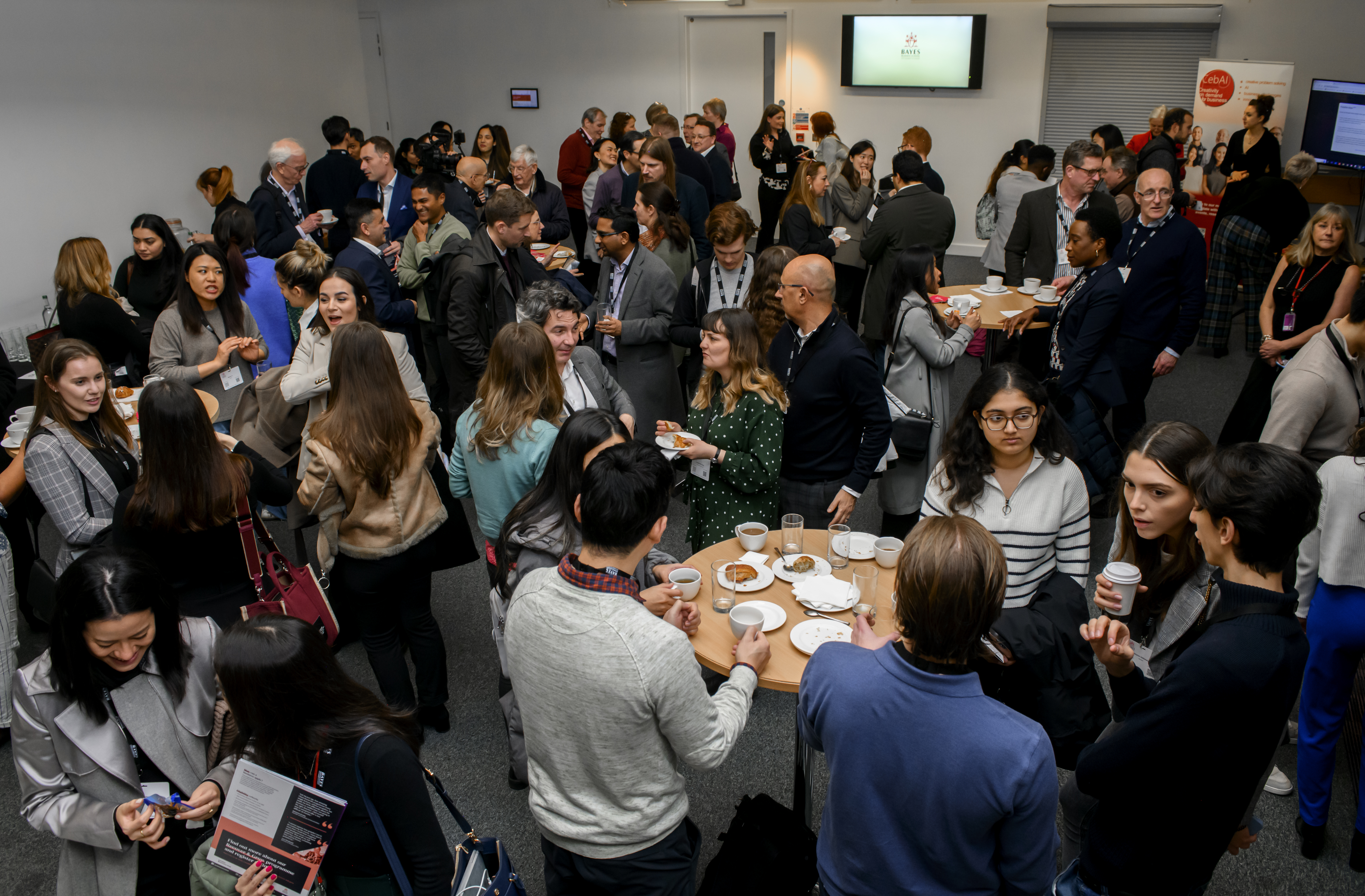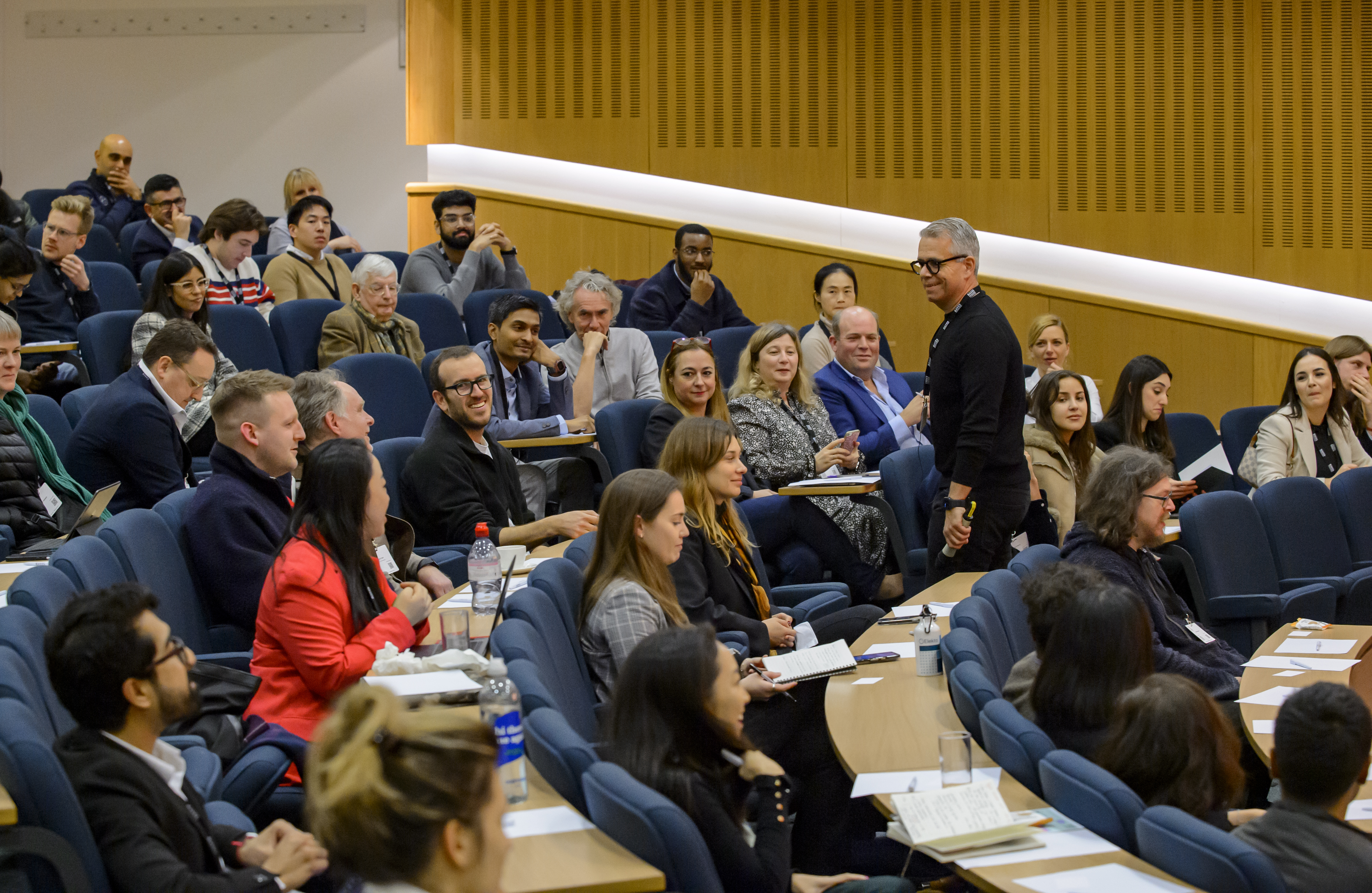More Human. More Social. How companies can implement effective ESG strategies to drive change
Bayes Innovate 2023 hosts professional leaders and entrepreneurs to explore the best ways to tackle the problems facing the business world.
The fifth annual Bayes Innovate conference explored the theme of addressing the biggest global issues, including the need for more effective environmental, social, and corporate governance under the theme ‘More Human. More Social.’
The interdisciplinary event, hosted by Bayes Business School and organised and hosted by Aurore Hochard, Head of Entrepreneurship Programmes, heard different perspectives on how businesses must approach their ESG targets and sustainable goals, and how to do so effectively and impactfully. With organisations under increasing pressure to understand and respond to rapidly changing conditions and ensure the continued sustainability of their organisations, achieving such goals are now non-negotiable.
Entrepreneurs and innovators and business practitioners attended and spoke at the event, which was opened by Professor Andre Spicer, Dean of Bayes Business School.

Professor Andre Spicer opens the Bayes Innovate 2023 conference. All photos by Karen Hatch
“If you look through a normal undergraduate degree programme, you often won’t see issues such as climate change, global inequality, the changing balance of global powers and resource depletion explicitly spoken about,” he said.
“It is vital we start looking at these things. Business schools have been founded upon a social mission. But where are we now? Many of these problems remain but steps are being taken. We want to give people the platform to improve their lives through business education, while asking the question: ‘how do we improve business for the future?’.”
Saasha Celestial-One, co-founder and COO of food-sharing platform Olio, gave the keynote speech and offered her experiences of launching her company and connecting supply and demand for food waste. Olio is now an organisation with 100,000 volunteers and has shared 100 million portions of food.
Ms Celestial-One said that 40 per cent minimum of food produced globally goes to waste, describing this as ‘mindboggling’, with 70 per cent of this wastage happening in our own homes. Thus, with friend Tessa Clarke, the idea for Olio was born.
 Saasha Celestial-One delivers the keynote speech at Bayes Innovate
Saasha Celestial-One delivers the keynote speech at Bayes Innovate
“We launched in north London, hand-delivering 10,000 letters, and then gave away food on street corners we had collected from local greengrocers that would have gone in the bin.
“Now we have a volunteer network. Initially, we recruited community people, trained them so they were qualified to collect unsold food at businesses and redistribute it. We have partnerships with more than 100 different businesses, including Tesco and Iceland, and make 25,000 collections a week, and distributing 45 million meals. We are on track to double that this year. The environmental impact is helping to prevent the equivalent of 400 million car miles on the road, and we have saved 15 billion litres of water. But we need to do more.
“For those wanting to start a business I would say start a scalable company that can solve a big problem, delight your first 100 users to build the brand, ask for help from your community, while remembering there is no such thing as arrival – it is a work in progress, and it is all testing and learning. And of course, enjoy the journey!”
The first panel event discussed the race to put artificial intelligence (AI) to work, and whether we had reached a tipping point for businesses and ESG. John Paul Danaee, co-founder and CEO of equitably.ai, led the session and spoke with Dr Tillman Weyde, Reader in Computer Science at City, University of London and Director of AI at equitably.ai; Vikas Nair, Founder and Chief Product Officer at Openlayer; and Zoe Peden, Partner at Ananda Impact Ventures.
 The opening panel on artificial intelligence in ESG
The opening panel on artificial intelligence in ESG
The speakers described the potential adverse and positive aspects of AI on businesses, investors and society with a focus on ESG.
Dr Weyde said: "AI has been worked on for some time and progress is more continuous than it seems from outside. Occasionally it attracts the interest of the media, and that impacts adoption and investment in research and development – at the moment that is driving AI.”
Ms Peden commented on AI advances in Finland and how AI is open to gathering patient data. “Advances are happening in healthcare now, but healthcare systems must digitise for it to be effective. I also believe there is great opportunity in the blue economy and what is happening in the oceans and rivers.”
Afternoon sessions began with a discussion on how ESG assessment of start-ups can be done to deliver insights into the valuation models to ensure hedge fund investors and venture capitalists can make sound financial decisions. Dr Paulina Roszkowska discussed with Alex Smith, Co-founder and Partner at The Sustainability Group and Future+; Joshua Cole, Founder and Portfolio Manager at Green Investment Partners; Dr Stephen Hampson, Investment Director at Oxford Capital; and Agnes Czako, Co-founder and CEO at AirEx.

Crowds gather to discuss at Bayes Innovate 2023
The panellists discussed their experiences of doing so, and practical ways firms can implement DEI into their ESG strategy, as well as whether regulation is moving towards VCs expecting more from their portfolio companies, and how companies can measure the right things. “How we invest is how we choose our future, this will create the future of the world,” concluded Dr Roszkowska.
The final panel session of the day was titled ‘Incorporating Diversity and Inclusion in your ESG strategy’. The discussion welcomed Dr Sonia Falconieri, Reader in Finance at Bayes, Dr Lauren McCarthy, Senior Lecturer in Corporate Social Responsibility at Bayes, Tofiq Qureshi, CEO of Innvotec, Mathew Joseph, Sustainability Director at Kinnevik VC, and Nicolina Andall, Non-Executive Director and Solicitor.
“The tone at the top of the organisation must change for a difference to be made,” said Mr Joseph. “My biggest fear is we act too quickly without incorporating real and meaningful change. It takes time for organisations to make progress here and it is a continuous journey.”
“Anyone can be an inclusive leader,” added Dr McCarthy. “For me, we mustn’t wait for it to trickle down.”
Workshops were led by Jean-Pascal Gond, Professor of Corporate Social Responsibility at Bayes, Santi Furnari, Professor of Strategy, and Valeria Piani, Head of Stewardship at Phoenix Group, discussed how to design effective collaborative shareholder engagements on ESG issues to benefit investors and society; and a two-part session with Dr Sara Jones, Director of the Centre for Creativity in Professional Practice at Bayes, and Andy Wilkins, founding partner of Perspectiv, workshopping how to use creative processes to examine potential impacts and implications of emerging trends.
Talks were hosted by Andreas Tsanakas, Professor of Risk Management at Bayes, on discrimination in insurance pricing and the need for insurers to prove that discrimination is not a material issue in their portfolio; Richard Kirk, CEO of BetterPoints, and Linda Coyle, Investment Manager at Bayes Entrepreneurship Fund, on their funding journey; and Dr Itziar Castello-Molina, Reader in Sustainability and Digital Economy at Bayes and Dr Manto Gotsi, Senior Lecturer in Marketing at Bayes in discussion with Dr Ruben van Werven, Lecturer in Entrepreneurship at Bayes, on radical transformation and change in relation to environmental challenges.

Costas Andriopoulos interacts with the audience at Bayes Innovate
The final thoughts of the day were presented by Professor Costas Andriopoulos, Professor of Management at Bayes, who discussed the value of curiosity, and how to build empathy and foster deeper connections with others.
Professor Andriopoulos led an interactive session to get people thinking about the value of asking the right questions, and how curiosity can help us progress personally and professionally.
Aurore Hochard, Head of Entrepreneurship Programmes at Bayes, closed the event by thanking the attendees and speakers for their contributions.
"There are increasing regulations and other initiatives in place or in progress, as well as growing pressure by investors, employees and customers for companies to set up and implement ESG strategies," said Mrs Hochard. "As such, leaders feel they have to make trade-offs to create sustainable practices, whether that is through investment or forgoing business opportunities.
"I am delighted that this year's Bayes Innovate served a very tangible purpose: open conversations and discussions between academics, entrepreneurs and investors on how executives and boards can help to profitably and ethically solve a set of problems relating to people or the planet."
Ends
